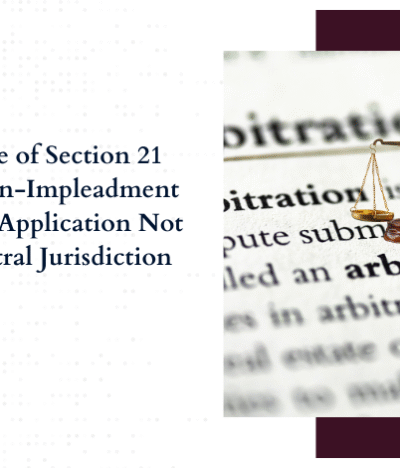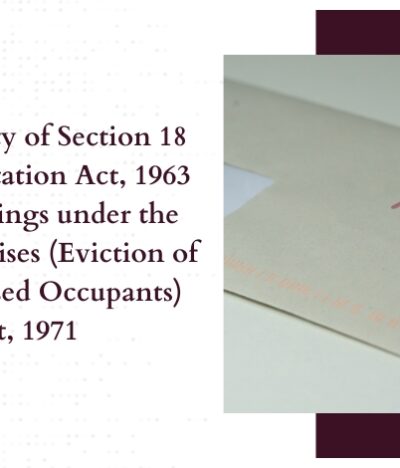Omkar Realtors And Developers Pvt. Ltd. V. Kushalraj Land Developers Pvt. Ltd. & Anr. (Neutral Citation: 2024 Insc 629)
The dominant purpose of the transaction must be examined to determine its nexus with profit generation and commercial activities. This assessment will evaluate whether the transaction aligns with business interests or serves personal use, impacting its classification under consumer protection laws and determining whether it constitutes a commercial transaction.
Brief Facts of the Case
The respondent, Kushalraj Land Developers Pvt. Ltd., a real estate development company, booked a residential flat in the appellant’s (Omkar Realtors and Developers Pvt. Ltd.) project on behalf of one of its directors. The flat was allotted with a possession date set for December 2018.
However, in March 2017, the appellant advanced the possession date and demanded the remaining balance. The respondent faced challenges in securing funding and subsequently discovered that the flat had also been allocated to another individual.
Consequently, the respondent declined to accept possession. In response, the appellant cancelled the booking and forfeited the payments made by the respondent. The appellant contested the respondent’s claim before the National Consumer Disputes Redressal Commission (NCDRC), arguing that the respondent did not qualify as a “consumer” under Section 2(7) of the Consumer Protection Act, 2019 and that the flat was intended for commercial purposes.
The NCDRC ruled that the respondent was indeed a “consumer,” finding the appellant liable for the double allotment, unjustified cancellation, and forfeiture of payments, which constituted a deficiency in service.
Definition of a “Consumer” under the Consumer Protection Act, 2019
“consumer” means any person who—
(a) buys any goods or avails any service from a seller or service provider, for consideration;
(b) hires or avails any services from a service provider for consideration;
and includes any person who—
(i) purchases or avails any goods or services through electronic means or by teleshopping or direct selling or multi-level marketing;
(ii) purchases or avails any goods or services from a seller or service provider located outside India through electronic means or otherwise;
(iii) is a beneficiary of goods or services bought or availed by another person;
but does not include a person who purchases or avails goods or services for—
(A) resale or for any commercial purpose; or
(B) rendering services as part of his business.
Issues
Two key issues were presented for adjudication before the NCDRC and further before the Hon’ble Supreme Court in the present case.
The first was whether the respondent’s complaint was maintainable, given the appellant’s assertion that the respondent did not qualify as a “consumer” under Section 2(7) of the Consumer Protection Act. The second issue was whether the appellant had committed a deficiency in service or if it was justified to terminate the respondent’s allotment and forfeit the deposits made.
Analysis of the Case
In its analysis of the case Omkar Realtors and Developers Pvt. Ltd. v. Kushalraj Land Developers Pvt. Ltd., the NCDRC examined two pivotal issues: the maintainability of the respondent’s complaint under the definition of “consumer” as per Section 2(7) of the Consumer Protection Act, 2019, and whether the appellant had committed a deficiency in service, thereby justifying the cancellation of the allotment and the forfeiture of the respondent’s deposits.
The NCDRC held that the respondent qualified as a “consumer” under Section 2(7) of the Act, drawing on precedents such as Lilavati Kirtilal Mehta Medical Trust v. Unique Shanti Developers and Crompton Greaves Limited v. Daimler Chrysler India Private Limited.
The court emphasized that the intent behind the purchase is critical in determining consumer status. In Lilavati, a medical trust purchasing residential properties for its nurses was deemed a consumer, as the activity was not classified as commercial. Similarly, in Crompton Greaves, the services availed for personal use by a company director were held to fall outside the realm of commercial purposes.
The NCDRC reiterated that Section 2(7) defines a “consumer” as an individual who purchases goods for consideration, explicitly excluding those who obtain goods for resale or commercial purposes. The determination of whether the purchased goods were for commercial use necessitates a nuanced understanding of the specific circumstances surrounding each transaction.
The court clarified that purchases intended for personal use, particularly in the context of family-owned businesses, do not automatically constitute commercial transactions.
In the case at hand, the NCDRC found that the flat in question was intended for the personal use of one of the respondent’s directors and his family, rather than for resale or profit generation. The appellant’s assertion that the respondent, being a real estate developer, could not be classified as a consumer was met with scepticism. The burden of proof rested with the appellant to demonstrate that the transaction was linked to a commercial endeavour, which it failed to do.
Turning to the second issue, the NCDRC addressed the appellant’s actions concerning the double allotment of the flat. The court noted that the flat was initially allocated to one Mr. Nakul Arya on April 10, 2013, before being subsequently allotted to the respondent in June 2016. This situation created significant confusion, which persisted until it was formally resolved through a rectification deed executed on March 17, 2018.
The NCDRC concluded that the appellant’s insistence on transferring possession and subsequent cancellation of the allotment before clarifying the double allotment was unjustified.
The court underscored that the appellant’s decision to forfeit the respondent’s deposit was legally untenable, particularly given that the confusion over the flat’s status had not been resolved prior to the termination of the allotment. The NCDRC’s ruling emphasized the importance of fair-trade practices, asserting that the appellant’s conduct constituted a deficiency in service.
The ruling aligns with the broader principles established in previous judgements, such as Daimler Chrysler India Pvt. Ltd. v. Controls & Switchgear Company Ltd., which clarified that the dominant purpose of a transaction is crucial in determining its nature—whether for personal use or commercial gain. The court reiterated that in evaluating whether a purchase was made for commercial purposes, the dominant intention behind the transaction must be assessed, focusing on whether there is a direct nexus to profit generation.
The NCDRC ultimately ruled in favour of the respondent, emphasizing that the flat’s purchase was intended for personal use and not as part of commercial activity. This judgement not only upheld the consumer’s rights but also reaffirmed the necessity for transparency and fairness in the conduct of real estate transactions.
The findings served as a cautionary reminder to developers and service providers regarding their obligations under consumer protection laws, advocating for a marketplace where consumer rights are prioritized and upheld against unfair practices. Thus, the NCDRC’s ruling not only addressed the specifics of this case but also contributed to the evolving jurisprudence surrounding consumer protection in India.
The Supreme Court, aligning with the NCDRC’s findings, affirmed that the respondents’ complaint was maintainable, underscoring the appellant’s deficiency in service. The Court upheld the directive for the appellant to refund the forfeited amount along with interest for delayed payment at a rate of 6% per annum from the date of deposit until the refund is made. It emphasized that failure to comply within the stipulated two-month period would result in an increased interest rate of 9% per annum.
This ruling not only reinforces the protection of consumer rights but also highlights the obligation of service providers to act transparently and responsibly in their dealings.
Conclusion
The Supreme Court’s affirmation of the NCDRC’s ruling underscores the critical importance of consumer protection within the real estate sector. By recognizing the respondents as consumers and addressing the appellant’s deficiencies in service, the Court reinforces the necessity for transparency and fairness in transactions, ultimately fostering a marketplace where consumer rights are upheld and protected against unfair practices.






